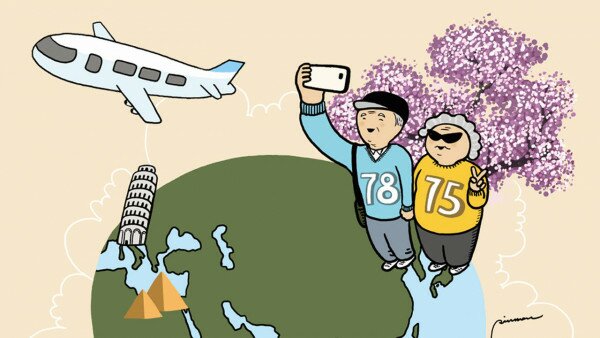Hong Kong's population is aging is a well-known fact. With society becoming more affluent and the advancement of medical technology, older people can now enjoy a much more splendid retirement life than before. In particular to the continuous growth in the seniors travel market, a review on the protection from relevant travel insurance plans unveiled gaps that have to be filled in order to meet the real needs of older people.
A Consumer Council survey revealed that quite a number of travel insurance plans have a maximum age limit. Even for those without an age limit, coverage on certain insured items for seniors could be discounted, the lowest one represented only 12.5% of the normal insurance coverage.
The Council opines that if insurance companies aim to develop the seniors travel insurance market, they have to design insurance plans that could cater for the real needs of older travellers. For example, they should cover medical and emergency evacuation and repatriation support are the most concerned items by the elderly travellers are more concerned with, and the claimable benefit limit can be adjusted to the same as that for younger insured adults, so as to provide the wider protection for older travellers. Insurance companies should also proactively explain all terms, conditions and restrictions in great detail during the selling process to enable a rational choice in selecting the right travel insurance plan, and to minimise possible arguments in case of future claims.
In the survey, the Council analysed a number of travel insurance plans offered by 13 insurance companies, including 39 single-trip travel insurance plans and 32 annual travel insurance plans. The findings show that 27 of the single-trip plans, or about 70% of the total, have an upper age limit for coverage at 70 to 90, and the ceiling of most of the plans is 75. For the annual plans, all have maximum age limit ranging from 65 to 90, and most of the plans are capped at 70.
Insurance plans with a maximum age limit usually do not accept people that pass the age limit to purchase. Only two of the insurance companies surveyed would consider accepting such applications, but the premium amount will be depended on the personal condition of the insured person, possibly with special conditions or restrictions imposed. One company handles it on a case by case basis, but it all still depends on the personal condition of the insured person.
Some insurance plans state that policyholders exceed a certain age could only enjoy a lower maximum coverage. For instance, 30 single-trip plans and 20 annual plans specify that if the insured person is aged over 65 to 75 or above, the maximum claim for personal accidents is only 12.5% to 83% of the normal amount.
The largest difference was found in a travel insurance plan that had a maximum age limit of 75. The maximum insurance benefit amount for personal accidents is HK$2 million for people aged 70 or below, but only HK$250,000 for people over 70.
Most of the insurance plans the Council surveyed state that there will be additional protection against death or permanent total disablement sustained while travelling on a public conveyance, in the form of payout at 150% or 200% of the insurance coverage on personal accidents. However, more than 40% of them stipulate that this additional protection is not applicable to insured people over 70 to 76 or above, who get only the normal insurance coverage.
As for medical expenses, 23 single-trip and 18 annual travel insurance plans offer lower insurance coverage to people who are above a specific age, ranging from 25% to 83% of the normal amount. To cite an example, one insurance plans with a maximum age limit of 75 offers maximum reimbursement of HK$1 million for medical expenses for people aged 70 or below, but only HK$250,000 for those aged above 70.
12 plans specify that insured people aged 65 (or 70) or above will not be protected if they engage in more risky activities, such as skiing, water biking, speed boating, hot air balloon riding or horse riding.
For emergency medical evacuation or repatriation, only 3 insurance plans (applicable to both including single-trip and annual plans) lower the maximum coverage if the insured person has reached the age of 71. The others treat people of all ages the same.
The survey findings show a variance in the level of protection offered by different travel insurance plans for older travellers. Here are some tips for choosing travel insurance plans who are planning to travel:
- Since older people in general have a greater need for medical expense coverage, they should focus more on maximum coverage for medical expenses, emergency medical evacuation or repatriation, a hospital deposit guarantee, and follow-up medical expenses in Hong Kong when choosing a travel insurance plan. If you are visiting Europe, the United States or other places where medical expenses are high, pick a plan with higher medical expenses coverage;
- Travel insurance covers only medical expenses for injuries or illnesses happening during the trip. The usual exclusions include treatment for relapse of pre-existing conditions;
- Buy the travel insurance as soon as possible after your air ticket, hotel and travel tour are confirmed to use the "trip cancellation" coverage in case of illness;
- Find out whether the insurance plan provides comprehensive, stand-alone coverage for global emergency support, such as emergency medical evacuation or repatriation, and whether there is unlimited cover.
The Consumer Council reserves all its right (including copyright) in respect of CHOICE magazine and Online CHOICE.



